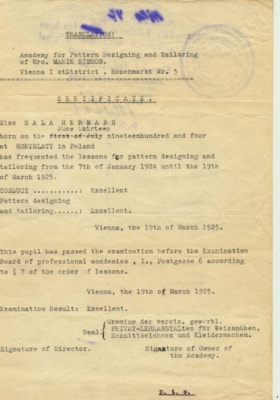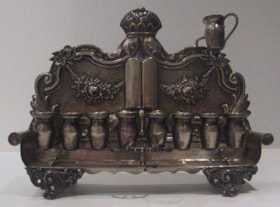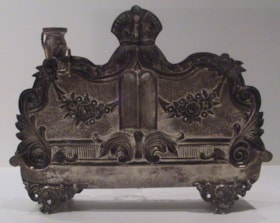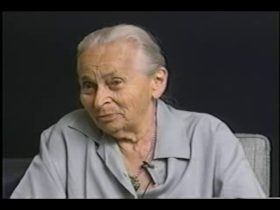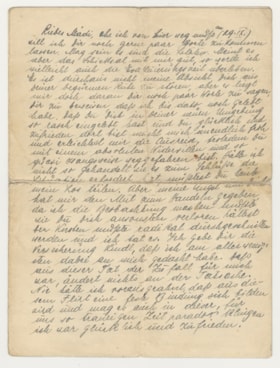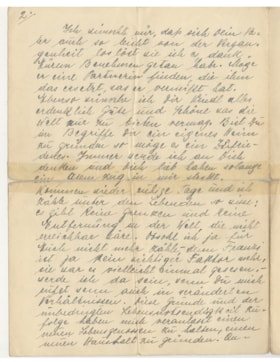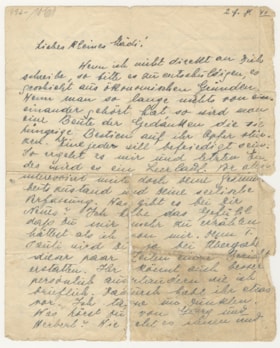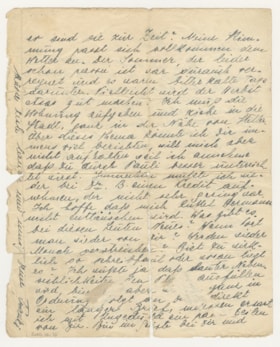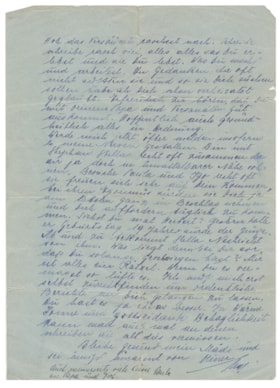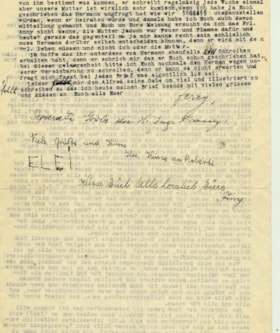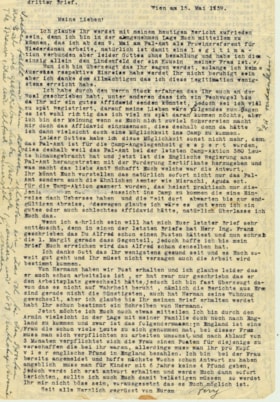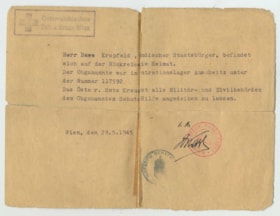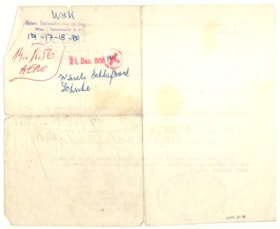Narrow Results By
Education certificate
https://www.cjhn.ca/link/cjhn76193
- Collection
- Montreal Holocaust Museum
- Description Level
- Item
- Material Type
- textual record
- Physical Description
- Education certificate : Paper : Printed, Handwritten : Ink : Green, Beige, Black, Gold, Green, Blue, Red ; Ht: 13 1/4 in. x W: 8 in.
- Date
- March 19, 1925
- Collection
- Montreal Holocaust Museum
- Description Level
- Item
- Material Type
- textual record
- Physical Description
- Education certificate : Paper : Printed, Handwritten : Ink : Green, Beige, Black, Gold, Green, Blue, Red ; Ht: 13 1/4 in. x W: 8 in.
- Other Title Information
- Documentary Artifact
- Date
- March 19, 1925
- Language
- English
- German
- Notes
- 1 page, single-sided. Folded three times horizontally and once vertically. Green fiscal stamp with red border, value of 500 kronen, affixed at upper left side. Gold fiscal stamp with blue border, value of 2000 kronen, affixed to the left of it. Document certfies that Miss Sala Hermann took a course in pattern designing and tailoring from January 7, 1924 until March 19, 1925. She received an assessment of 'excellent' in conduct, as well as in pattern designing and tailoring. She received examination results of 'excellent'. Certificate issued by the Academy for Pattern Designing and Tailroing of Mrs. Marie Simmon. Narrative: Sala (Hermann) Heiss was the mother of the donor, Erika Bloom. The Heiss family fled Nazi-occupied Vienna in 1938, after Salomon was arrested and detained in Dachau for 3 days. They survived the war in Shanghai, immigrated to Israel in 1949, and eventually settled in Montreal.
- Accession No.
- 2002.22.02
- Name Access
- Bloom, Erika
- Places
- Vienna, Austria, Europe
- Archival / Genealogical
- Archival Descriptions
- Repository
- Montreal Holocaust Museum
Images
Education certificate
https://www.cjhn.ca/link/cjhn76217
- Collection
- Montreal Holocaust Museum
- Description Level
- Item
- Material Type
- textual record
- Physical Description
- Education certificate : Paper : Printed, Handwritten : Ink : Grey, Beige, Brown ; Ht: 13 3/8 in. x W: 8 1/4 in.
- Date
- June 19, 1920
- Collection
- Montreal Holocaust Museum
- Description Level
- Item
- Material Type
- textual record
- Physical Description
- Education certificate : Paper : Printed, Handwritten : Ink : Grey, Beige, Brown ; Ht: 13 3/8 in. x W: 8 1/4 in.
- Other Title Information
- Documentary Artifact
- Date
- June 19, 1920
- Physical Condition
- Good
- Language
- German
- Notes
- 1 page, single-sided. Folded once horizontally and once vertically. Grey and beige background referring to a schoolbook publisher, beige border. Document is a certificate issued to Salomon Heiss for the 1919/1920 school year, attesting that he completed a special course on ready-made clothing at a vocational school. Personal information at top of page, followed by handwritten grades. Grading legend at bottom. Narrative: Salomon Heiss was the father of the donor, Erika Bloom. The Heiss family fled Nazi-occupied Vienna in 1938, after Salomon was arrested and detained in Dachau for 3 days. They survived the war in Shanghai, immigrated to Israel in 1949, and eventually settled in Montreal.
- Accession No.
- 2002.30.27
- Name Access
- Bloom, Erika
- Places
- Vienna, Austria, Europe
- Archival / Genealogical
- Archival Descriptions
- Repository
- Montreal Holocaust Museum
Images
Etrog box
https://www.cjhn.ca/link/cjhn51360
- Collection
- Montreal Holocaust Museum
- Description Level
- Item
- Material Type
- object
- Physical Description
- Etrog box : Hand chased, engraved ; Ht: 3 3/8 in. x W: 5 3/4 in.
- Date
- 1861
- Collection
- Montreal Holocaust Museum
- Description Level
- Item
- Material Type
- object
- Physical Description
- Etrog box : Hand chased, engraved ; Ht: 3 3/8 in. x W: 5 3/4 in.
- Other Title Information
- Ceremonial Artifact
- Date
- 1861
- Physical Condition
- Good
- Notes
- Rectangular with a floral designs, has a vertical concave indentation on each side, oval bulge in center of lid, box has lock which is broken, key is missing. Lid is hinged, and opens upwards. Narrative: To protect the etrog during the Sukkot holiday
- Accession No.
- 2005.26.3
- Name Access
- Tauben, Irwin
- Places
- Vienna, Austria, Europe
- Archival / Genealogical
- Archival Descriptions
- Repository
- Montreal Holocaust Museum
Images
Ha’Koach swim team
https://www.cjhn.ca/link/cjhn45889
- Collection
- Montreal Holocaust Museum
- Description Level
- Item
- Material Type
- graphic material
- Physical Description
- Photograph : Paper : Black, White ; Ht: 3 3/4 in. x W: 5 in.
- Date
- 1938
- Collection
- Montreal Holocaust Museum
- Description Level
- Item
- Material Type
- graphic material
- Physical Description
- Photograph : Paper : Black, White ; Ht: 3 3/4 in. x W: 5 in.
- Other Title Information
- Documentary Artifact
- Date
- 1938
- Physical Condition
- Good
- Notes
- B&w. Outdoors. Boys and girls of the Austrian Ha’Koach swim team sitting on the grass under the trees beside the Danube river, girl at left is holding a banner which reads “Jugend Schwimmer Der Hakoah” (young swimmers of the Hakoah), banner has a Star of David in the center
- Accession No.
- 2005.27.2
- Name Access
- Pisker, Anne
- Places
- Vienna, Austria, Europe
- Archival / Genealogical
- Archival Descriptions
- Repository
- Montreal Holocaust Museum
Images
Hanukkah lamp
https://www.cjhn.ca/link/cjhn76263
- Collection
- Montreal Holocaust Museum
- Description Level
- Item
- Material Type
- object
- Physical Description
- Hanukkah lamp : Silver ; Ht: 7 1/8 in. x W: 9 1/2 in.
- Date
- [Prior to 1900]
- Collection
- Montreal Holocaust Museum
- Description Level
- Item
- Material Type
- object
- Physical Description
- Hanukkah lamp : Silver ; Ht: 7 1/8 in. x W: 9 1/2 in.
- Other Title Information
- Ceremonial Artifact
- Date
- [Prior to 1900]
- Physical Condition
- Good
- Notes
- Back plate embossed and edged with rococo style scrolls and flowers. Tablet shape at centre of back plate, with crown atop pointed centre. Outward curves of the sides resemble a divan. Fronted by a row of eight detabhable oil receptacles; a ninth receptable is placed atop the back plate on the right side.
- Accession No.
- 2005.26.01
- Name Access
- Tauben, Irwin
- Places
- Vienna, Austria, Europe
- Archival / Genealogical
- Archival Descriptions
- Repository
- Montreal Holocaust Museum
Images
Hiess, Anna - Oral History of a Holocaust Survivor
https://www.cjhn.ca/link/cjhn60300
- Collection
- WITNESS TO HISTORY COLLECTION (MHMC-02)
- Description Level
- Item
- Material Type
- moving images
- Physical Description
- 01:04:39
- Collection
- WITNESS TO HISTORY COLLECTION (MHMC-02)
- Description Level
- Item
- Material Type
- moving images
- Physical Description
- 01:04:39
- Language
- English
- Notes
- Anna Hiess (née Fliesser) was born in Vienna, Austria on April 12, 1914. Her family moved to Lemberg in 1918, after Anna’s father’s death. They were an assimilated family and did not experience discrimination before 1938, with the exception that they could not study wherever and whatever they wanted. Anna married in 1938. She left Lemberg with her husband in 1941, shortly after the German invasion. They went to Hrubieszow where they stayed a few months under false identity, leaving when people started to suspect they were Jews. They moved to Garwolin by train where they were helped by Stanislaw Piaskowski and the underground that provided them with a place to live and ration cards. Anna’s job was to conceal the forbidden radio while her husband worked in the income tax department. After the war, they moved to Lodz and started a new life with their son. The family immigrated to Israel in 1950 because Anna’s husband was in danger since he got involved in politics. They were disappointed when they arrived in Tel-Aviv and felt hostility coming from Jews who had lived in Israel since before the war. They decided to immigrate to Montreal in 1952, sponsored by a Canadian family they never met.
- Accession No.
- WTH-086
- Name Access
- Hiess, Anna
- Places
- Vienna, Austria , Europe
- Archival / Genealogical
- Archival Descriptions
- Repository
- Montreal Holocaust Museum
Images
Identification card
https://www.cjhn.ca/link/cjhn78426
- Collection
- Montreal Holocaust Museum
- Description Level
- Item
- Material Type
- textual record
- Physical Description
- Identification card : Paper : printed, typed, stamped, handwritten : Ink : green, purple, blue, black, white ; Ht: 14,8 cm x W: 10,3 cm
- Date
- January 25, 1957
- Collection
- Montreal Holocaust Museum
- Description Level
- Item
- Material Type
- textual record
- Physical Description
- Identification card : Paper : printed, typed, stamped, handwritten : Ink : green, purple, blue, black, white ; Ht: 14,8 cm x W: 10,3 cm
- Other Title Information
- Documentary Artifact
- Date
- January 25, 1957
- Physical Condition
- Poor
- Language
- English
- French
- German
- Notes
- 1 page. Two-sided folded vertically. On the recto is personal information, including visa number, filled with a blue pen. Inside is stapled a b&w picture of Sylvia Holcz on the t.l. The document was used to the purpose of immigration to Montreal. Sylvia Holcz arrived in Canada on 1957-01-14. Narrative: Sylvia Holcz, also known as Szilvia Holcz, was born in Uherské Hradišt?, Czech Republic on 1922-02-16. After the war, she married Deszo Losoncy. She left Hungary with her husband and daughter Susanna (born on 1947-07-01) soon after the Revolution of 1956 and settled in Montreal, Canada in 1957-01.
- Accession No.
- 2014.21.11
- Name Access
- Loronci, Susan
- Places
- Vienna, Austria, Europe
- Archival / Genealogical
- Archival Descriptions
- Repository
- Montreal Holocaust Museum
Images
Identification card
https://www.cjhn.ca/link/cjhn78427
- Collection
- Montreal Holocaust Museum
- Description Level
- Item
- Material Type
- textual record
- Physical Description
- Identification card : Paper : printed, typed, stamped, handwritten : Ink : green, purple, blue, black, white ; Ht: 14,7 cm x W: 10,4 cm
- Date
- January 06, 1957
- Collection
- Montreal Holocaust Museum
- Description Level
- Item
- Material Type
- textual record
- Physical Description
- Identification card : Paper : printed, typed, stamped, handwritten : Ink : green, purple, blue, black, white ; Ht: 14,7 cm x W: 10,4 cm
- Other Title Information
- Documentary Artifact
- Date
- January 06, 1957
- Physical Condition
- Good
- Language
- English
- French
- German
- Notes
- 1 page. Two-sided folded vertically. On the recto is personal information, including visa filled in blue ink. Inside is a b&w picture of Deszo Losoncy stapled on the t.l. Two circular blue ink stamp. The document was used for the purpose of immigration to Montreal. Deszo Losoncy arrived in Canda on 1957-01-06. Narrative: Deszo Losoncy, also known as Löwy or Losonczy, was born in Szentes, Hungary on 1904-04-12. He was deported to Birkenau, Poland for 14 to 16 months as a political prisoner. In this concentration camp, he was forced to work and clean Dr. Josef Mengele's laboratory. Later, Deszo Losoncy was also detained in Sachsenhausen, Germany, where he was liberated on 1945-04-25 by the Red Army. After the war, he lived in Budapest, Hungary and became a textile professional. He left Hungary soon after the Hungarian Revolution of 1956 and settled in Montreal, Canada in 1957-01 with his wife Sylvia Holcz.
- Accession No.
- 2014.21.12
- Name Access
- Loronci, Susan
- Places
- Vienna, Austria, Europe
- Archival / Genealogical
- Archival Descriptions
- Repository
- Montreal Holocaust Museum
Images
Lehrbuch der Hebräischen Sprache für Schul- und Selbstunterricht.
https://www.cjhn.ca/link/cjhn47516
- Collection
- Montreal Holocaust Museum
- Description Level
- Item
- Material Type
- textual record
- Physical Description
- Book : printed, bound : green, black, grey-purple, beige ; Ht: 22,3 cm x W: 15,7 cm
- Date
- 1920
- Collection
- Montreal Holocaust Museum
- Description Level
- Item
- Material Type
- textual record
- Physical Description
- Book : printed, bound : green, black, grey-purple, beige ; Ht: 22,3 cm x W: 15,7 cm
- Other Title Information
- Documentary Artifact
- Date
- 1920
- Creator
- -
- Physical Condition
- Poor
- Language
- German
- Hebrew
- Notes
- 376 pages. Hardcover, cardboard bound with string and fabric tape along the spine. Cover is green with black text inside a decorative, black border. Fabric tape along the spine is grey-purple. Both covers are the same, but in 2 different languages. Interior pages are beige, with text divided into chapters, articles and columns. The book is divided in 2, each side starts with a new language; at the centre of the book, where both halves of the book meet, there is a glossary in both languages. Narrative: Consists of two sections - reading book and lessons. The reading section in Hebrew contains narrations, poems, sayings, etc. The section of lessons includes vocabulary, grammar and exercises.
- Accession No.
- 2001.85.02
- Name Access
- Hiliam, Kenneth
- Places
- Vienna, Austria, Europe
- Archival / Genealogical
- Archival Descriptions
- Repository
- Montreal Holocaust Museum
Images
Letter
https://www.cjhn.ca/link/cjhn59368
- Collection
- Montreal Holocaust Museum
- Description Level
- Item
- Material Type
- textual record
- Physical Description
- Letter : Paper : Typewritten : Ink : Beige, black ; Ht: 15 cm x W: 20,5 cm
- Date
- December 05, 1956
- Collection
- Montreal Holocaust Museum
- Description Level
- Item
- Material Type
- textual record
- Physical Description
- Letter : Paper : Typewritten : Ink : Beige, black ; Ht: 15 cm x W: 20,5 cm
- Other Title Information
- Documentary Artifact
- Date
- December 05, 1956
- Physical Condition
- fragile
- Language
- English
- Notes
- Short letter, folded horizontally and vertically. From the United Hias Service (Austria) to the Canadian Embassy in Vienna. Director V.P. Plumenthal confirms that the overseas Hias committee will assist with the adjustment of the Lorincz family. Narrative: Rev. Isodore Lorincz was born 6 January 1908 in Hungary. His parents were Lowi Netti and Loliner (?) Jakob. He attended high school and Yeshiva, and graduated from the Jewish Theological Seminary of Budapest with ordination and smicha. During World War 2 his family was killed in Auschwitz. He came to Canada in 1957 after fleeing the revolution in Hungary. He served in two congregations before serving the Shaare Zedek Congregation as ritual director, then as Chazzan Sheni with a congregation in Hamilton, Ontario, for three years. Afterwards he served as rabbi in Port Colborne, Ontario. He settled in Montreal, Quebec, in 1962 where he became Chazzan Sheni for the next 26 years. He and his wife, Zita, continued to live in Montreal until there death around 2005.
- Accession No.
- 2000.72.3
- Name Access
- Goldman, Harry
- Places
- Vienna, Austria, Europe
- Archival / Genealogical
- Archival Descriptions
- Repository
- Montreal Holocaust Museum
Images
Letter
https://www.cjhn.ca/link/cjhn59902
- Collection
- Montreal Holocaust Museum
- Description Level
- Item
- Material Type
- textual record
- Physical Description
- Letter : Paper : Handwritten : Ink : beige ; Ht: 21,2 cm x W: 32 cm
- Date
- 1939-1945
- Collection
- Montreal Holocaust Museum
- Description Level
- Item
- Material Type
- textual record
- Physical Description
- Letter : Paper : Handwritten : Ink : beige ; Ht: 21,2 cm x W: 32 cm
- Other Title Information
- Documentary Artifact
- Date
- 1939-1945
- Physical Condition
- Good
- Language
- German
- Notes
- Single pieces of yellowing paper folded threefold vertically and once horizontally. Horizontal fissure is repaired with a single piece of Scotch tape. Page 2 segment is numbered at TL. Letter sent by Franzi Goldberger to her daughter Liselotte Goldberger in England. Liselotte Goldberger changed her name to Charlotte Goldhill in 1951. Her married name is Charlotte Urban. Narrative: Charlotte Urban, originally called Liselotte Goldberger, was born in 1919 in Vienna, Austria. Her parents were Yaakob and Franzi Goldberger. She lived with her family in an apartment on Staudinger Gasse in Brigittenau, which was a mostly-Jewish area. She considered herself more Viennese, and her first language was German. In a statement she says she remembers when the Germans invaded Austria during the Anschluss. One day, she and her mother were ordered out of their building by the SA and forced to scrub the pavement in front of a crowd. Afterwards the commander wrote them a receipt for their work on a piece of cigarette paper. Charlotte kept it until her death. Her father had made it to England, and was working to get her and her mother visa. He was away during the Kristallnacht. They remained safe because their land lady, Frau Grabner, had a son in the Nazi party and would use that to discourage troops from coming into their room. When Charlotte got her papers her mother decided to stay with her family. They parted at the station, and Charlotte never saw her again. Liselotte later discovered that her mother had been deported to Theresienstadt in October 1942. Charlotte changed her name to Charlotte Goldhill and married Joseph Urban in 1951. She became a Canadian citizen in 1959.
- Accession No.
- 2010.16.15
- Name Access
- Berger, Leon
- Places
- Vienna, Austria, Europe
- Archival / Genealogical
- Archival Descriptions
- Repository
- Montreal Holocaust Museum
Images
Letter
https://www.cjhn.ca/link/cjhn59903
- Collection
- Montreal Holocaust Museum
- Description Level
- Item
- Material Type
- textual record
- Physical Description
- Letter : Paper : Handwritten : Ink : Beige, Black ; Ht: 20,2 cm x W: 16,2 cm
- Date
- August 24, 1940
- Collection
- Montreal Holocaust Museum
- Description Level
- Item
- Material Type
- textual record
- Physical Description
- Letter : Paper : Handwritten : Ink : Beige, Black ; Ht: 20,2 cm x W: 16,2 cm
- Other Title Information
- Documentary Artifact
- Date
- August 24, 1940
- Physical Condition
- Poor
- Language
- German
- Notes
- Letter written on both sides in pen. Divided in four by horizontal and vertical folds. Vertical fold is torn until fold intersection. One centimeter on right side folded with additional text scrawled vertically. A portion of the letter was lost during removal of an adhesive substance on page two. Letter sent by Franzi Goldberger to her daughter Liselotte Goldberger. Narrative: Charlotte Urban, originally called Liselotte Goldberger, was born in 1919 in Vienna, Austria. Her parents were Yaakob and Franzi Goldberger. She lived with her family in an apartment on Staudinger Gasse in Brigittenau, which was a mostly-Jewish area. She considered herself more Viennese, and her first language was German. In a statement she says she remembers when the Germans invaded Austria during the Anschluss. One day, she and her mother were ordered out of their building by the SA and forced to scrub the pavement in front of a crowd. Afterwards the commander wrote them a receipt for their work on a piece of cigarette paper. Charlotte kept it until her death. Her father had made it to England, and was working to get her and her mother visa. He was away during the Kristallnacht. They remained safe because their land lady, Frau Grabner, had a son in the Nazi party and would use that to discourage troops from coming into their room. When Charlotte got her papers her mother decided to stay with her family. They parted at the station, and Charlotte never saw her again. Liselotte later discovered that her mother had been deported to Theresienstadt in October 1942. Charlotte changed her name to Charlotte Goldhill and married Joseph Urban in 1951. She became a Canadian citizen in 1959.
- Accession No.
- 2010.16.16
- Name Access
- Berger, Leon
- Places
- Vienna , Austria, Europe
- Archival / Genealogical
- Archival Descriptions
- Repository
- Montreal Holocaust Museum
Images
Letter
https://www.cjhn.ca/link/cjhn59904
- Collection
- Montreal Holocaust Museum
- Description Level
- Item
- Material Type
- textual record
- Physical Description
- Letter : Paper : Handwritten : Ink : Blue, dark blue ; Ht: 29,5 cm x W: 21 cm
- Date
- July 20, 1942
- Collection
- Montreal Holocaust Museum
- Description Level
- Item
- Material Type
- textual record
- Physical Description
- Letter : Paper : Handwritten : Ink : Blue, dark blue ; Ht: 29,5 cm x W: 21 cm
- Other Title Information
- Documentary Artifact
- Date
- July 20, 1942
- Physical Condition
- Good
- Language
- German
- Notes
- Letter written on both sides in blue pen. Folded three time horizontally and once in half. Paper is dog eared and has various creases, as well as water damage diagonally across page one and on the left side on page two. Sent by Franzi Goldberger to her daughter Liselotte Goldberger after they were separated in Austria and Liselotte moved to England with her father. Narrative: Charlotte Urban, originally called Liselotte Goldberger, was born in 1919 in Vienna, Austria. Her parents were Yaakob and Franzi Goldberger. She lived with her family in an apartment on Staudinger Gasse in Brigittenau, which was a mostly-Jewish area. She considered herself more Viennese, and her first language was German. In a statement she says she remembers when the Germans invaded Austria during the Anschluss. One day, she and her mother were ordered out of their building by the SA and forced to scrub the pavement in front of a crowd. Afterwards the commander wrote them a receipt for their work on a piece of cigarette paper. Charlotte kept it until her death. Her father had made it to England, and was working to get her and her mother visa. He was away during the Kristallnacht. They remained safe because their land lady, Frau Grabner, had a son in the Nazi party and would use that to discourage troops from coming into their room. When Charlotte got her papers her mother decided to stay with her family. They parted at the station, and Charlotte never saw her again. Liselotte later discovered that her mother had been deported to Theresienstadt in October 1942. Charlotte changed her name to Charlotte Goldhill and married Joseph Urban in 1951. She became a Canadian citizen in 1959.
- Accession No.
- 2010.16.17
- Name Access
- Berger, Leon
- Places
- Vienna, Austria, Europe
- Archival / Genealogical
- Archival Descriptions
- Repository
- Montreal Holocaust Museum
Images
Letter
https://www.cjhn.ca/link/cjhn60104
- Collection
- Montreal Holocaust Museum
- Description Level
- Item
- Material Type
- textual record
- Physical Description
- Letter : Paper : beige ; Ht: 11"5/8 in. x W: 7"5/8 in.
- Date
- May 5, 1939
- Collection
- Montreal Holocaust Museum
- Description Level
- Item
- Material Type
- textual record
- Physical Description
- Letter : Paper : beige ; Ht: 11"5/8 in. x W: 7"5/8 in.
- Other Title Information
- Documentary Artifact
- Date
- May 5, 1939
- Physical Condition
- Good
- Language
- German
- Notes
- 1 page letter, typed on both sides. Letter was written by Pesach Mandel with a note from his wife and daughter Elfi at the end. Narrative: The donor's father Pesach (Ferdinand) Mandel was originally from Stanislau (Poland). His family emigrated to Austria where he became a dentist. He married Sarafina and they had two daughters, Elfi and Ilse. The Mandel family lived in a suburb of Vienna. In the 1930s there were rumors of war and they wanted to leave. Pesach's sister Margit, her husband Alfred Beck and their son Robert left for New York but it was hard for them to find work and support themselves. Pesach's brother Hermann emigrated to Palestine where he also had problems finding work. Pesach was interned in concentration camp Dachau (Germany) but was released thanks to his connections to Christian friends in the military. Following his release, the family was able to go back to Stanislau (Poland) where they moved in with relatives and worked making tombstones. In 1941, after Germany attacked the USSR, the Mandel family was interned by the Russians and deported to Siberia. From there they were moved to the Ural district and later to Karagandy (Kazakhstan). Persach died at the age of 39. The rest of the family was released in 1948 and was able to move back to Vienna.
- Accession No.
- 2005.32.03
- Name Access
- Vockathaler, Elfi
- Places
- Vienna, Austria, Europe
- Archival / Genealogical
- Archival Descriptions
- Repository
- Montreal Holocaust Museum
Images
Letter
https://www.cjhn.ca/link/cjhn60106
- Collection
- Montreal Holocaust Museum
- Description Level
- Item
- Material Type
- textual record
- Physical Description
- Letter : Paper : beige ; Ht: 11"1/2 in. x W: 7"5/8 in.
- Date
- May 15, 1939
- Collection
- Montreal Holocaust Museum
- Description Level
- Item
- Material Type
- textual record
- Physical Description
- Letter : Paper : beige ; Ht: 11"1/2 in. x W: 7"5/8 in.
- Other Title Information
- Documentary Artifact
- Date
- May 15, 1939
- Physical Condition
- Good
- Language
- German
- Notes
- 1 page letter, typed on both sides, handwitten along side of first page. Letter was written by Pesach Mandel and signed by his wife and their daughter Elfi. Narrative: The donor's father Pesach (Ferdinand) Mandel was originally from Stanislau (Poland). His family emigrated to Austria where he became a dentist. He married Sarafina and they had two daughters, Elfi and Ilse. The Mandel family lived in a suburb of Vienna. In the 1930s there were rumors of war and they wanted to leave. Pesach's sister Margit, her husband Alfred Beck and their son Robert left for New York but it was hard for them to find work and support themselves. Pesach's brother Hermann emigrated to Palestine where he also had problems finding work. Pesach was interned in concentration camp Dachau (Germany) but was released thanks to his connections to Christian friends in the military. Following his release, the family was able to go back to Stanislau (Poland) where they moved in with relatives and worked making tombstones. In 1941, after Germany attacked the USSR, the Mandel family was interned by the Russians and deported to Siberia. From there they were moved to the Ural district and later to Karagandy (Kazakhstan). Persach died at the age of 39. The rest of the family was released in 1948 and was able to move back to Vienna.
- Accession No.
- 2005.32.05
- Name Access
- Vockathaler, Elfi
- Places
- Vienna, Austria, Europe
- Archival / Genealogical
- Archival Descriptions
- Repository
- Montreal Holocaust Museum
Images
Letter
https://www.cjhn.ca/link/cjhn78324
- Collection
- Montreal Holocaust Museum
- Description Level
- Item
- Material Type
- textual record
- Physical Description
- Letter : Paper : typed, handwritten : Ink : beige, black, purple, blue, red ; Ht: 14,6 cm x W: 19,6 cm
- Date
- May 29, 1945
- Collection
- Montreal Holocaust Museum
- Description Level
- Item
- Material Type
- textual record
- Physical Description
- Letter : Paper : typed, handwritten : Ink : beige, black, purple, blue, red ; Ht: 14,6 cm x W: 19,6 cm
- Other Title Information
- Documentary Artifact
- Date
- May 29, 1945
- Physical Condition
- Good
- Language
- German
- Notes
- 1 horizontal page. Two-sided letter issued by the Red Cross. The document is a correspondence from the U.K. to Utrecht (The Netherlands). The text on the recto is typed and the text on the verso is handwritten. The letter sent to Holocaust survivor David Kropveld contains family news. Narrative: David Kropveld was born on 1918-1-3 in Amsterdam, Holland. He was the third child of Samuel Kropveld, born in 1884-3, and Goedge Van Cleef, born in 1894. His father had studied to be a doctor before he was enlisted in 1916. His mother was a nursery school teacher until her marriage. As a boy he participated in Boy Scouts, acrobatic and boxing training. He studied at a commercial college, and opened a silver, gold, and diamond business during the Great Depression. In 1936 he was chosen to represent Holland as a boxer in the Olympics, but he chose not to go. He trained as a naval officer, and was prepared to attend university when the Germans occupied Holland in May 1940. In July, David and his father joined the White Brigade resistance group in the south of France. As members, David and his father gave up their Jewish identities and were responsible for taking children to safe houses and participating in armed attacks on German convoys. During this time David used the alibis Charles Seegers and Dan Daladien. In October 1942, David was arrested while smuggling war-related information between occupied and Vichy France. He was tortured for ten days before escaping with the aid of two men from the resistance. He was reunited with his father in Brussels, but the two were arrested by Gestapo officers one week later. They were incarcerated for three months and deported to Auschwitz where they were considered political prisoners and were selected for the slave labor camp at Monowitz Camp. They remained there for 5 days prior to being transferred to Treblinka Camp. In Treblinka, David witnessed his father’s murder at the hands of a guard. During this time Goedge had been sent to Sobibor where she was gassed and cremated on 1943-5-7. In the fall of 1944, a guard recognized David as a boxer he admired and had him transferred back to Auschwitz and on to Monowitz in December 1944 to compete in boxing matches against other prisoners. The rest of David’s family was killed during the war. Of his siblings Gretha died of hunger in Malapane, Poland with her husband in September 1942, Hartog was injured as a sergeant in the army and executed after his capture on 1943-6-30, Rosette was gassed in Sobibor on 1943-7-23 while pregnant, and Israel was beaten to death during a protest on a transport bound for Buchenwald. In December 1944, David managed to escape the death march with a few other prisoners. He was rescued shortly after and brought to a hospital until his health improved, although he never fully recovered and spent most of his life physically handicapped. In the summer of 1945, David met his wife, Annie Cohen. They had two sons, Mike and Phillip Kropveld. In 1947, the couple immigrated to Cuba, and then, in 1950, to Montreal, Canada, where David began a successful career as a butcher. He died in Montreal on 2008-11-26 at the age of 91.
- Accession No.
- 1990.83.16
- Name Access
- Kropveld, David
- Places
- Vienna, Austria, Europe
- Archival / Genealogical
- Archival Descriptions
- Repository
- Montreal Holocaust Museum
Images
Letter
https://www.cjhn.ca/link/cjhn78431
- Collection
- Montreal Holocaust Museum
- Description Level
- Item
- Material Type
- textual record
- Physical Description
- Letter : Paper : printed, stamped, handwritten : Ink : off-white, black, red, blue ; Ht: 16,2 cm x W: 20,3 cm
- Date
- December 21, 1956
- Collection
- Montreal Holocaust Museum
- Description Level
- Item
- Material Type
- textual record
- Physical Description
- Letter : Paper : printed, stamped, handwritten : Ink : off-white, black, red, blue ; Ht: 16,2 cm x W: 20,3 cm
- Other Title Information
- Documentary Artifact
- Date
- December 21, 1956
- Physical Condition
- Good
- Language
- German
- English
- Notes
- 1 page.Two-sided horizontal paper. Filled in blue ink. The letter gives authorisation to travel and immgrate to Canada. Narrative: Deszo Losoncy, also known as Löwy or Losonczy, was born in Szentes, Hungary on 1904-04-12. He was deported to Birkenau, Poland for 14 to 16 months as a political prisoner. In this concentration camp, he was forced to work and clean Dr. Josef Mengele's laboratory. Later, Deszo Losoncy was also detained in Sachsenhausen, Germany, where he was liberated on 1945-04-25 by the Red Army. After the war, he lived in Budapest, Hungary and became a textile professional. He left Hungary soon after the Hungarian Revolution of 1956 and settled in Montreal, Canada in 1957-01 with his wife Sylvia Holcz.
- Accession No.
- 2014.21.16
- Name Access
- Loronci, Susan
- Places
- Vienna, Austria, Europe
- Archival / Genealogical
- Archival Descriptions
- Repository
- Montreal Holocaust Museum
Images
Machzor
https://www.cjhn.ca/link/cjhn47419
- Collection
- Montreal Holocaust Museum
- Description Level
- Item
- Material Type
- book
- Physical Description
- Book : printed, bound, gilded, imprinted : brown, gold, beige, black ; Ht: 18,5 cm x W: 12,5 cm
- Date
- 1881
- Collection
- Montreal Holocaust Museum
- Description Level
- Item
- Material Type
- book
- Physical Description
- Book : printed, bound, gilded, imprinted : brown, gold, beige, black ; Ht: 18,5 cm x W: 12,5 cm
- Other Title Information
- Ceremonial Artifact
- Date
- 1881
- Physical Condition
- Good
- Language
- Hebrew
- Serbo-Croatian
- Notes
- 227 pages. Hardcover, cardboard bound with string. Cover is brown faux-leather with a gilded decorative border and gilded imprinted text in the centre; the title is imprinted the same way on the front and back covers, but in different languages. The spine has gilded detailing and text. The page edges are gilded. The inside covers are textured metallic pink paper. The interior pages are white with black text. Narrative: Machzor for Pesach, Shavuot and Sukkot. Given as bar-mitzvah gift to Elias Levi (donor’s grandfather) by his parents in Belgrade in 1884.
- Accession No.
- 1997.35.01
- Name Access
- Levi, Elias
- Places
- Vienna, Austria, Europe
- Archival / Genealogical
- Archival Descriptions
- Repository
- Montreal Holocaust Museum
Images
Machzor
https://www.cjhn.ca/link/cjhn47622
- Collection
- Montreal Holocaust Museum
- Description Level
- Item
- Material Type
- book
- Physical Description
- Book : printed, bound, gilded : beige, black, gold ; Ht: 15 cm x W: 10,6 cm
- Date
- 1899
- Collection
- Montreal Holocaust Museum
- Description Level
- Item
- Material Type
- book
- Physical Description
- Book : printed, bound, gilded : beige, black, gold ; Ht: 15 cm x W: 10,6 cm
- Other Title Information
- Ceremonial Artifact
- Date
- 1899
- Physical Condition
- Good
- Language
- English
- Hebrew
- German
- Notes
- 252 pages, hardcover, cardboard bound with a faded black cover; front cover has a faded-ornate design done in gold, with a frame around it's boarder and a sun-burst type design. Interior pages are beige, consisting of text.
- Accession No.
- 2011X.149.01
- Name Access
- Goldstein, Al
- Places
- Vienna, Austria, Europe
- Archival / Genealogical
- Archival Descriptions
- Repository
- Montreal Holocaust Museum
Images
Machzor
https://www.cjhn.ca/link/cjhn47623
- Collection
- Montreal Holocaust Museum
- Description Level
- Item
- Material Type
- book
- Physical Description
- Book : printed : black, gold, red, beige ; Ht: 19,4 cm x W: 13,7 cm
- Date
- 1932
- Collection
- Montreal Holocaust Museum
- Description Level
- Item
- Material Type
- book
- Physical Description
- Book : printed : black, gold, red, beige ; Ht: 19,4 cm x W: 13,7 cm
- Other Title Information
- Ceremonial Artifact
- Date
- 1932
- Physical Condition
- Good
- Language
- German
- Hebrew
- Notes
- Approximately 400 pages (exact number unknown). Hardcover, cardboard bound with string. Covers are black leather ? with a crackling pattern and rounded edges; the front cover has a gilded design along 3 edges; the title is gilded on the spine; page edges are gilded. Inside covers are textured beige with a pattern of red roses with gilded stems. A band of maroon leather is visible along the spine. Interior pages are beige with text, each page is divided into 2 columns, with Yiddish text on the right side and German text on the left, and sometimes the bottom.
- Accession No.
- 2011X.229.03
- Name Access
- Matalon, Ilse
- Places
- Vienna, Austria, Europe
- Archival / Genealogical
- Archival Descriptions
- Repository
- Montreal Holocaust Museum
Images
{{ server.message }}


